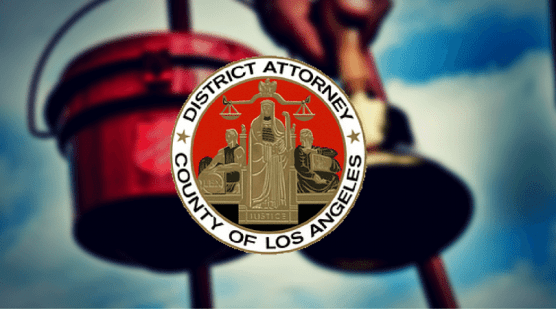A Los Angeles County Superior Court judge said Tuesday a decision in the case of the union for county prosecutors against District Attorney George Gascón could come by the end of the week, after hearing both sides of the argument.
Judge James C. Chalfant held a preliminary injunction hearing at the Stanley Mosk Courthouse in L.A., where attorneys for the union argued that such a hearing was appropriate to help prevent deputy district attorneys from “violating the law.” The lawsuit argues that it was illegal for Gascón to issue what they deemed as a blanket rule that prohibits prosecutors from seeking sentencing enhancements under the Three Strikes law.
“I think preliminary injunction here is appropriate, your honor, in particular, because, as a result of the special directives, the deputy district attorneys in this county are put in the unfortunate position of having to violate the law in carrying out their duties in prosecuting these cases,” said David Carroll, attorney for the union. “By the special directives, telling the deputy district attorneys, ‘It doesn’t matter; you can’t plead these anyway. You must dismiss all of them,’ I think the deputy district attorneys are literally having to violate these laws and these statutory duties.”
The county prosecutors union has not proven, however, that they have the legal right to bring forth the lawsuit, according to Robert Dugdale, attorney for Gascón.
“It’s important because it determines whether they get their foot in the door here at all,” he said. “Standing is jurisdictional and that means the union has to do more than merely allege standing. They have to prove it and the union here has not come close to establishing that it has standing to bring these claims on behalf of its members.“
Chalfant said he thought the county prosecutors union’s approach on standing was reasonable.
“Their cases say that their labor union has standing to challenge employee work conditions. Well, isn’t that an employee work condition to compel a deputy district attorney to go down and dismiss strike priors?” said the judge.
If a deputy district attorney goes to the D.A. and says they can’t dismiss a strike prior, Dugdale said, nothing is likely to happen nor has happened in the past to his knowledge. However, some deputy DAs have shared that they feel intimidated as they are monitored in the courts and fear retaliation for going against the administration.
“Nobody has been disciplined on this issue. The union’s just wrong about any alleged injury in this case,” said Dugdale.
Carroll said he believes that it is not right for deputy D.A.s to “actually have to face a disciplinary proceeding for the state Bar before any injunctive relief is held.”
Tuesday’s hearing comes after the Los Angeles Association of Deputy District Attorneys filed a lawsuit Dec. 30 against Gascón regarding his sentencing enhancements directive, which they dubbed “not merely radical, but plainly unlawful.”
In December, the D.A. said he would allow no exceptions to his elimination of “enhancements,” a legal term used by lawyers to modify charges for reasons, such as prior convictions, gang involvement, etc.
“While an elected district attorney has wide discretion in determining what charges to pursue in an individual case, that discretion does not authorize him or her to violate the law or to direct attorneys representing the district attorney’s office to violate the law,” Michele Hanisee, president of the ADDA, said in a statement when the lawsuit was filed.
After mounting pressure from local law enforcement and even deputy district attorneys, Gascón later announced he would not eliminate prior-conviction enhancements, gang enhancements, special circumstances enhances or out-on-bail enhancements.
“Where aggravating factors exist, I believe existing sentencing schemes provide sufficient latitude to prosecutors to seek higher sentences, but some victims remain concerned, and I want you to know that we are listening,” Gascón said then in a letter announcing the updates.
Like this:
Like Loading...
Related





 Tweet This
Tweet This Facebook
Facebook Digg This
Digg This Bookmark
Bookmark Stumble
Stumble RSS
RSS


























REAL NAMES ONLY: All posters must use their real individual or business name. This applies equally to Twitter account holders who use a nickname.
0 Comments
You can be the first one to leave a comment.